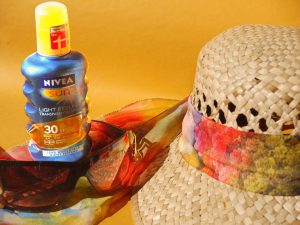Summer isn’t all fun in the sun. There is a dangerous threat lurking in those UV rays so many of us love to soak up! While exposure to UV radiation makes your skin tan, it also puts you at risk for developing skin cancer. Skin cancer is the most common type of cancer in the United States (and the world) – there are more diagnoses of skin cancer each year than all other types of cancer combined. Luckily, not all types of skin cancer are deadly, and there are ways to prevent, detect, and treat it.
Let’s Talk Numbers
- 1 in 5 people will be diagnosed with skin cancer in their lifetime.
- More than 9,500 people in the United States are diagnosed with skin cancer each day.
- Having 5 or more sunburns doubles your risk for melanoma, the deadliest type of skin cancer.
- When detected early, the survival rate for melanoma is estimated to be around 98%.
Know Your Risk Factors
There are some genetic and lifestyle factors that put people at a greater risk for developing skin cancer. It’s important to know your own risk profile and to take the appropriate precautions, as well as to keep your primary care practitioner up to date.

- Light skin: According to the American Cancer Society, fair skinned people are over 20 times more likely to be diagnosed with skin cancer than Black people.
- Coloring: The risk goes up for people with blonde or red hair, blue or green eyes, or skin that is prone to burns and freckles.
- Age: Risk of skin cancer increases with age, though melanoma is one of the most common cancers in young adults age 25-28.
- UV Exposure: The risk is greatly increased for people who have had at least one severe sunburn as a child or who use tanning beds before the age of 30.
- Family History: Although most types of skin cancer are not caused by inheriting a faulty gene, melanoma does seem to run in families – 1 in every 10 people diagnosed with melanoma has a family member who has also had it.
The Solution Is Simple

Although skin cancer is generally treatable, it’s far easier to take preventative measures and avoid the disease altogether. Make these simple lifestyle changes part of your summer routine and you’ll stay a step ahead of skin cancer.
- Wear Sunscreen. Every. Single. Day. Some folks think sunscreen is exclusively for the beach, but you should wear sunscreen year round! It’s easy to get a sunburn during a long car ride, or even while sitting in a sunny office window.
- SPF 30, minimum. The SPF (Sun protection factor) of your sunscreen must be at or above 30 for daily activities. If you’ll be outside for longer, working up a sweat, or near water, reapply often.
- Avoid peak sun hours. Most experts agree that the sun is at its most powerful between 11 am and 3pm. Others suggest an even wider window, from 10am to 4pm. Not everyone can avoid the outdoors during those hours, so it’s important to take precautions if you’ll be outside for long.
- Cover up. Not for modesty, but for skin protection. Even sunscreen isn’t perfect, so the only sure-fire protection is to cover your skin or seek shade if you’re outside during peak sun hours. Wide brimmed hats or light scarves can work wonders for your shoulders and neck, which are at the highest risk for sunburns.
Not to put a damper on your summer fun, but skin cancer is serious! Taking these simple precautions can reduce your risk of contracting skin cancer, and can protect your skin from burns and early aging. And always discuss any concerns with your primary care practitioner, as early detection greatly reduces mortality rates.
